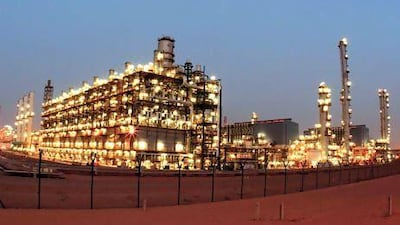Arabian Gulf petrochemical giants - once the privileged beneficiaries of cheap and plentiful gas supplies that fuelled the largest plastics plants in the world - fear they are in danger of losing out to the United States unless their governments step in.
Major producers such as Saudi's National Petrochemical Industrial Company (Natpet) are urging their governments to maintain generous incentive programmes in the face of growing competition from the West and its glut of cheap shale gas blasted from the ground by wildcatters. Even Saudi Basic Industries Corporation (Sabic), the world's biggest petrochemical maker, is evaluating plans for its first plant in the US.
"There has been a migration of investment to the United States that is a very clear threat to the growth of the [GCC] petrochemical industry," said Jamal Malaikah, the president of Natpet, which operates a polypropylene plant in Yanbu. "We are very concerned about that and we call upon the governments in the GCC to look upon this very carefully."
Until recently, the Gulf's plentiful gas feedstock and strategic access to East Asian manufacturers made it a prime location for multibillion-dollar complexes making the raw materials that go into a wide range of products from power cables to water bottles to car bumpers. Western partners competed to build the best training centre or make the biggest charity donation to win the favour of Gulf partners who could give them access to gas.
Now those advantages have fallen to the Americans. Regional feedstock have mostly been committed, and upcoming gas supplies are needed to meet power demand that is growing at a rate of more than 10 per cent a year in hubs such as Abu Dhabi.
The region's remaining gas requires more costly and complicated technology to produce. Saudi Arabia's Sadara, the US$20 billion (Dh73.46bn) joint venture between Dow Chemical and Saudi Aramco, will have to make do in part with naphtha, a heavier feedstock that is harder to crack.
Saudi industry executives fear that the government will raise the price of feedstock. "We believe this is the wrong time to do that because of the shale gas," said Mr Malaikah. "We still have an advantage in Saudi Arabia but we believe that advantage will be affected by the sheer volume of shale gas in the United States."
On top of low gas prices, Saudi producers also enjoy government aid from cheap land to low-cost financing by state banks. But they are also under pressure to create more jobs for nationals by expanding further down the product chain.
If regional petrochemical makers are feeling the heat, the companies that use their products - makers of throwaway goods such as plastic bottle caps and clear takeaway packs - are continuing to expand. Rahim Jamal, the general manager of Al Shihab Al Thahabi Technical Trading, an equipment supplier, said orders for machinery to mould plastic topped €7.5 million (Dh36.4m) last year.
That is fuelled by a rise in consumption in the Middle East, set to double from 260 million tonnes in 2007 to 540 million tonnes in 2020.

